

| 31 March 2016
Association Tunisienne de la Santé de la Reproduction
The Tunisian Association for Reproductive Health (ATSR), created in April 1968, works in the field of Sexual and Reproductive Health (SRH) and promotes rights through a multi-sectoral partnership. ATSR provides and facilitates access to SRH information and services, particularly for women, young people and the most underserved and vulnerable populations including migrants and refugees, LGBT, PLHIV, and sex workers. ATSR also provides comprehensive sexuality education programmes for young people in and out of school to develop their capacity to empower themselves and assert their right to dignity, equality and a healthy, satisfying and responsible sexual life. ATSR has five service delivery centres and three mobile units. In 2020, ATSR provided approximately 200,000 SRH services to 40,000 beneficiaries.

| 31 March 2016
Fianakaviana Sambatra, Madagascar
Relative to much of Africa, Madagascar has high levels of contraceptive use, but high birth rates coupled with endemic poverty and limited government-led sexual and reproductive health (SRH) provision mean that child mortality and maternal death figures are high. Fianakaviana Sambatra (FISA) has been fighting since 1967 to improve the nation’s SRH through advocacy, education and direct service provision. Currently, it runs 67 service points, including: 11 permanent clinics, 3 mobile units and 12 community-based services (CBSs), across 6 of the country’s regions. FISA works with 5 associated clinics and 29 private practitioners. FISA has 70 full-time staff, 184 peer educators, and a youth action movement made up of 42 members. FISA delivers a wide range of services: family planning, prevention and management of HIV and the provision and dissemination of comprehensive SRH materials. FISA has used its on-the-ground experience to advise government on national SRH policy. It has partnered with the Ministry of Health, Family Planning and Social Protection, and the Ministry of Youth to advocate for a concerted approach to resolving the critical SRH issues currently facing the country. At the same time, it works with non-governmental organizations (NGOs) such as Marie Stopes International, and the ASSONG coalition of NGOs. FISA receives financial support from UNFPA, the Big Lottery Fund, Amélioration de la Qualité De Services, the EU and IPPF’s Japan Trust Fund. It’s also closely connected to other organizations promoting SRH rights across the country and the region.







